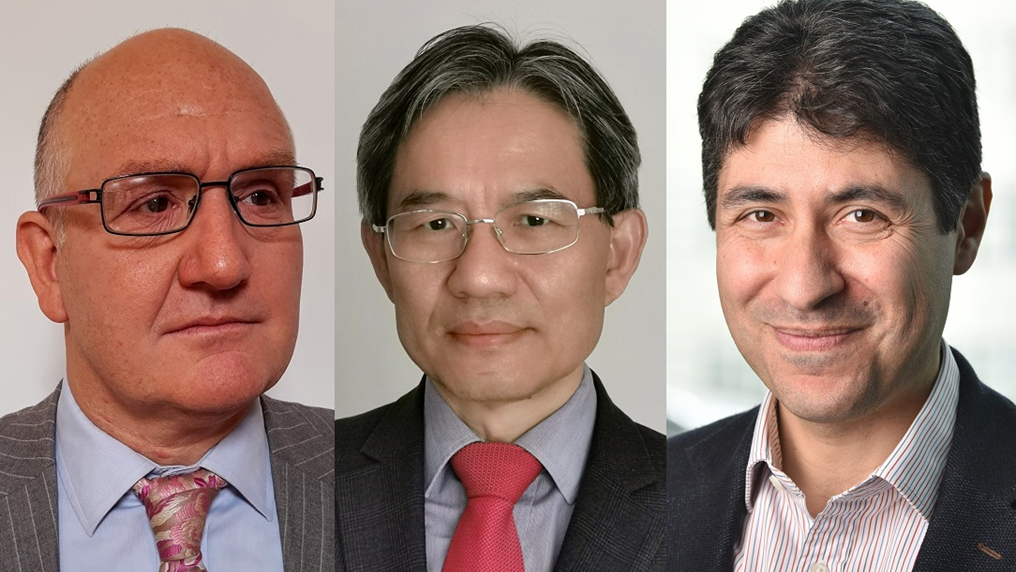IChemE Fellows elected to the Royal Academy of Engineering

5th October 2020
Three chemical engineers and Fellows of the Institution of Chemical Engineers (IChemE) – Yulong Ding, David Edwards and Omar Matar – have been elected Fellows of the UK’s Royal Academy of Engineering (RAEng) for their outstanding contributions to engineering.
The University of Birmingham’s Yulong Ding, Founding J Chamberlain Professor of Chemical Engineering, was recognised for his distinguished academic leadership and pioneering work in energy materials and thermal systems.
His work has led to important innovations in new thermal energy storage materials, cryogenic energy storage, engine technology and temperature regulation technologies for rail and road vehicles that have widespread societal applications to address future global sustainable energy challenges. This work also saw him part of the team that triumphed at the IChemE Global Awards 2019 winning the Energy and Research Project categories and scooping the overall winning trophy, the Outstanding Achievement Award.
Ding, a volunteer of IChemE’s Particle Technology Special Interest Group committee, said:
“I am deeply honoured and truly delighted to be elected as a Fellow of the Royal Academy of Engineering. As a chemical engineer working on energy materials and thermal systems, I look forward to continuing my work and contributing to the profession.”
David Edwards, Operational Excellence Manager at Thames Water, was elected for his specialism in membrane technologies and contributing to the innovation, design and build of the largest ultra-filtration plant in the world and the only global desalination reference scheme.
He has worked in various senior technical and leadership roles for some of the largest international water and environmental companies. He was also commended for coaching and mentoring young engineers at Thames Water, and for contributing to UK and European Membrane Regulatory Framework.
For the past 14 years he has volunteered with IChemE interviewing those aiming to become a Chartered Chemical Engineer. He said:
“Within the department we have a mixture of operational logicians, engineers and scientists. The activities are varied, which is what makes leading the team interesting. Whether its evaluating chemical dosing, or optimal energy use on the largest water treatment works in Europe, operating the only desalination plant in the UK, isolating a 250 megalitres service reservoir – that is so large, it has a golf course on built on it – or designing and building new assets for future generations, no day is boring.
“The Royal Academy of Engineering has some really inspirational values. The specific aspect that resonated with me, was its ambition to promote societal engineering and drive public value through investing in up-and-coming young engineers and plights of the future. I am excited to be a part of this and hope I can use my experience to develop process engineers in my sector, the water industry, and wider.”
Omar Matar, Professor of Fluid Mechanics in the Department of Chemical Engineering and Vice-Dean (Education) of the Faculty of Engineering at Imperial College London, has been recognised for being a world leader in the modelling and simulation of complex, industrially-relevant multiphase flows.
His research focuses on fluid mechanics and data-centric engineering with energy and manufacturing applications. He is working to develop the next-generation of data-driven, physics-constrained, multi-fidelity predictive tools for improving design and decision-making for managing safety and reducing carbon emissions.
Matar said:
“It is a huge honour to be appointed FREng. Many thanks to my research group and collaborators, the Department of Chemical Engineering at Imperial, and the College for their support. I will endeavour to exemplify the RAEng values of progressive leadership, diversity and inclusion, excellence, collaboration, and innovation.”
IChemE President Stephen Richardson said:
“Congratulations to Yulong, David and Omar for being elected by their peers as Fellows of the Royal Academy of Engineering for their inspirational contributions to chemical engineering. They are leading examples of how their work is positively contributing to sustainable energy storage solutions, tools for safety management and innovative water filtration systems benefiting communities around the world.”
The three IChemE members join 50 other engineers from across disciplines who were awarded Fellowships by the RAEng this year. They join almost 1,600 eminent engineers from both industry and academia.
Image
L-R: David Edwards, Yulong Ding and Omar Matar
Contact
For more information please contact:
Rachael Fraser, Communications Executive, IChemE
t: +44 (0) 1788 534435
e: rfraser@icheme.org
Ketna Mistry, Communications Executive, IChemE
t: +44 (0) 1788 534484
e: kmistry@icheme.org
What is chemical engineering?
Chemical, biochemical and process engineering is the application of science, maths and economics in the process of turning raw materials into everyday, and more specialist, products. Professional chemical engineers design, construct and manage process operations all over the world. Oil and gas, pharmaceuticals, food and drink, synthetic fibres and clean drinking water are just some of the products where chemical engineering plays a central role.
IChemE
The Institution of Chemical Engineers (IChemE) advances chemical engineering's contribution worldwide for the benefit of society. We support the development of chemical engineering professionals and provide connections to a powerful network of around 35,000 members in 100 countries.
We support our members in applying their expertise and experience to make an influential contribution to solving major global challenges, and are the only organisation to award Chartered Chemical Engineer status and Professional Process Safety Engineer registration.